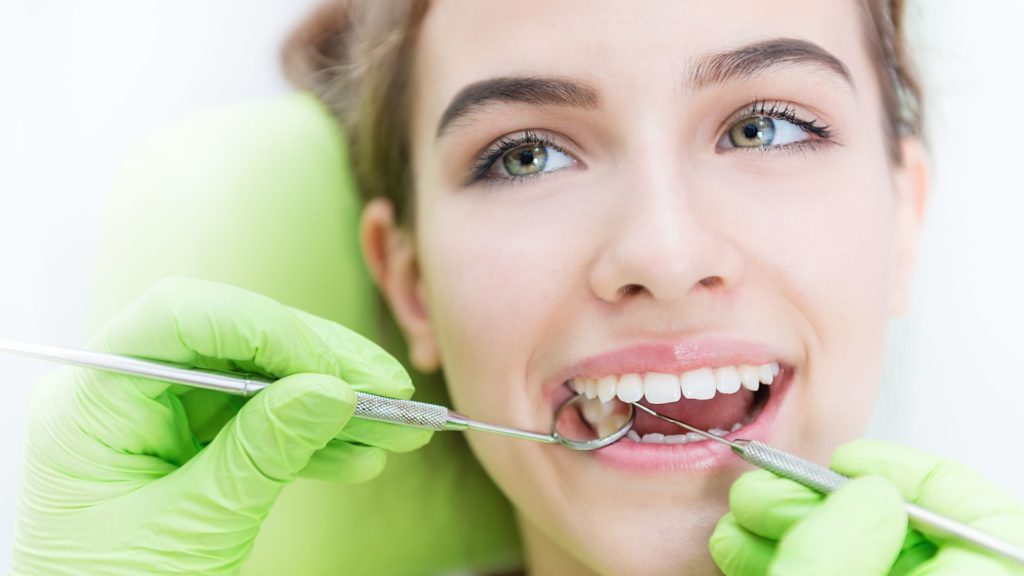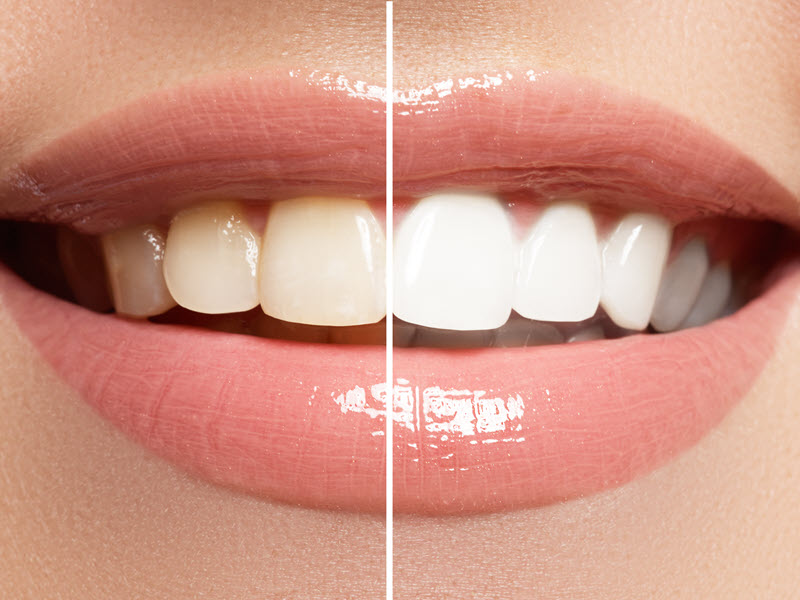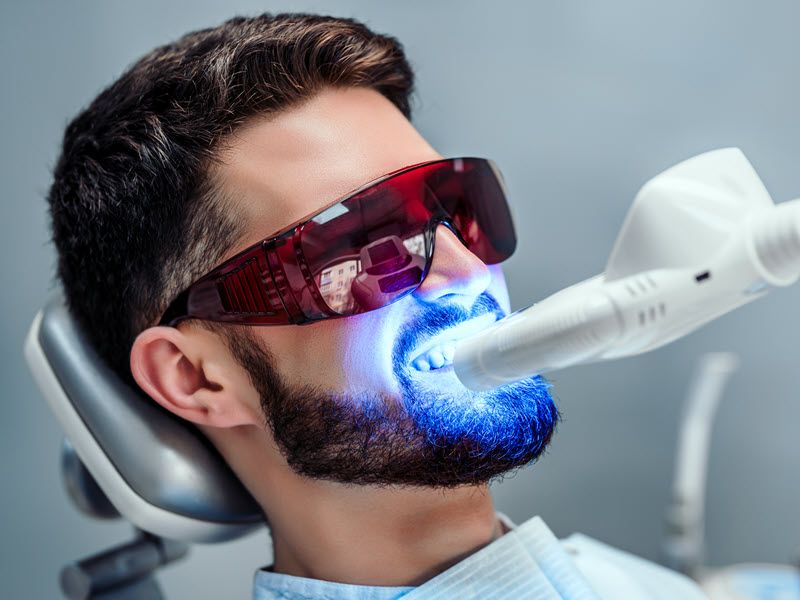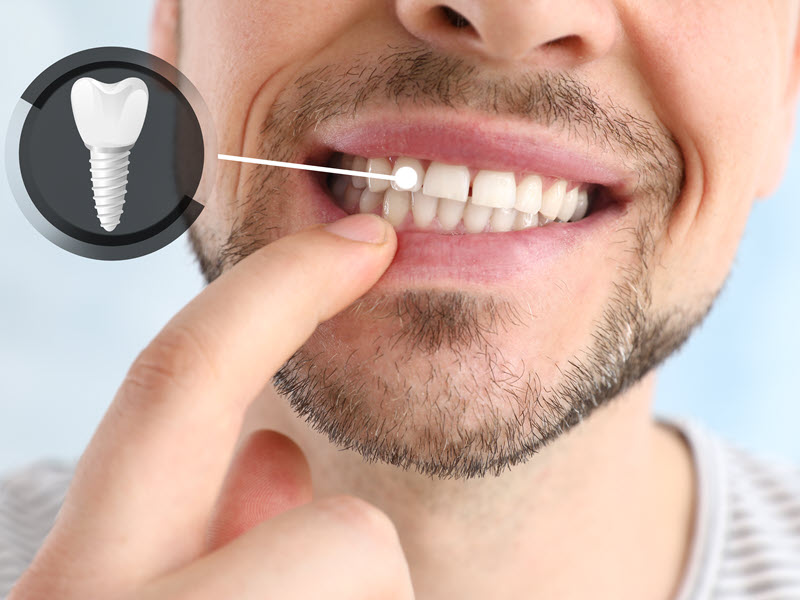Understanding Periodontal Disease
Important Takeaway
With early detection, proper periodontal therapy treatment, and proper oral hygiene, you can keep your teeth for a lifetime.
Defining Periodontal Disease
Periodontal disease, also known as gum disease, involves inflammation and infection of the tissues that support your teeth. It starts when bacteria build up on teeth, forming plaque. If not removed, plaque turns into tartar, leading to gingivitis – which is first stage periodontal disease. If left untreated, gingivitis develops into more advanced stages of periodontal disease, damaging the bone and tissue around your teeth and ultimately causing tooth loss. Proper oral hygiene and regular dental checkups help prevent the development of periodontal disease.

Periodontal Disease Can Result in Extensive, Widespread Tooth Loss
Causes of Periodontal Disease
The main cause of periodontal disease is bacteria buildup in dental plaque. Other factors that contribute to the condition include:
- Poor oral hygiene: Neglecting to brush and floss daily allows plaque to accumulate.
- Tobacco use: Smoking and using smokeless tobacco both increase the risk of gum disease.
- Genetics: Some people have a higher risk of developing periodontal disease based on their genetic makeup.
- Medications: Certain medicines can cause dry mouth or affect gum tissue, increasing the chance of developing gum disease.
- Chronic illnesses: Conditions such as diabetes, rheumatoid arthritis, and HIV infection contribute to an increased risk of periodontal disease.

Dr. Killeen of the University of Nebraska Medical Center Gives a Good Overview of Periodontitis
By understanding the causes and definition of periodontal disease, you can take the necessary steps to protect your oral health and keep your teeth longer. Maintain good oral hygiene practices, avoid tobacco use, and visit your dentist regularly to mitigate the risks.
Recognizing Symptoms of Periodontal Disease
Periodontal Disease Initial Signs
Recognizing early signs of periodontal disease keeps your teeth and gums healthy. Look for these symptoms:
- Reddish or purplish gums: Healthy gums are pink and firm. Change in color means you need to take action.
- Bleeding gums: If you see blood when you brush or floss, it’s a warning sign.
- Bad breath: Persistent bad breath may indicate gum disease.
- Soreness: Tender gums can signal a developing issue.
A good oral care routine often helps stop these initial signs from turning into a severe issue. 
Red, Swollen, Inflamed Gums are a Possible Indicator of Gum Disease
Advanced Periodontal Disease Symptoms
As periodontal disease worsens, you’ll notice more severe symptoms. Keep an eye out for the following:
- Pain when chewing: Discomfort while eating may signal a deeper problem.
- Gum recession: Gums that pull away from your teeth are a sign of disease progression.
- Loose teeth: A shift in your teeth or loose teeth indicates more advanced periodontal disease.
- Pus: If you see pus between your teeth and gums, it’s a clear sign of infection.
Addressing these symptoms with a dental professional helps protect your teeth and overall oral health.
Risk Factors for Periodontal Disease
Lifestyle Factors
One of the main lifestyle factors contributing to periodontal disease is smoking. Smoking increases your risk because it weakens your immune system and reduces blood flow, making it harder for your body to fight off the infection. In addition, a poor diet and lack of essential nutrients can also increase your risk for gum disease. Consuming foods low in vitamins and nutrients can compromise your immune system and increase the chances of you developing an infection. Foods high in sugar content cause inflammation and should be avoided.
Stress also plays a role in periodontal disease. High stress levels hinder your body’s ability to fight infections, including those in your mouth. Managing stress through relaxation techniques or exercise can help reduce your risk. 
Stress Can be a Contributing Factor for Many Health Problems, Including Periodontal Disease
Genetic and Health Factors
Genetics can affect your susceptibility to periodontal disease. If your family has a history of gum disease, you may be more likely to develop it. To counteract genetic factors, be diligent with your oral hygiene routine and visit your dentist regularly.
Certain health conditions are known to increase your risk of periodontal disease. Diabetes is often linked to a higher risk; high blood sugar levels can lead to inflammation and gum problems. Managing your diabetes through proper diet and medication is crucial to maintaining good oral health.
Obesity is another risk factor for periodontal disease. Excess weight can lead to inflammation and other health problems, including gum disease. Maintaining a healthy weight through diet and exercise can help you avoid this risk.
Age is yet another risk factor; as you get older, your risk for developing gum disease increases. To maintain healthy gums as you age, practice good oral hygiene and visit your dentist regularly for checkups and cleanings.
Periodontal Disease and Oral Hygiene
Impact of Poor Oral Hygiene
Poor oral hygiene can lead to the buildup of dental plaque on your teeth. Plaque is a sticky film of bacteria that can harden into tartar if not removed. Tartar can only be removed by a dental professional, and its presence can lead to periodontal disease.
When you don’t regularly clean your teeth and gums, bacteria can spread, causing inflammation and damage to the tissues that support your teeth. This damage can result in gum recession, tooth loss, and the progression of periodontal disease.
Importance of Regular Dental Visits
Scheduling regular dental visits is crucial in maintaining good oral health and preventing periodontal disease. Dentists can thoroughly clean your teeth, removing plaque and tartar that you may have missed during your daily oral hygiene routine.
Dental professionals can also identify early signs of periodontal disease, allowing them to provide appropriate treatment and guidance for improving your oral hygiene habits. By visiting the dentist regularly, you can work together to maintain strong, healthy teeth and prevent the progression of periodontal disease.
Diagnosis of Periodontal Disease
Diagnostic Measures
To diagnose periodontal disease, your dentist will first review your medical history to identify any factors linked to the symptoms. They will perform a thorough oral examination and assess your gum health. This includes measuring the depth of the pockets around your teeth using a small probe, checking for inflammation, and evaluating any bone loss that may have occurred. X-rays are often taken to assess the severity of the disease and track any changes over time.
Periodontal disease is associated with the buildup of plaque and tartar on teeth. Your dentist will usually perform a thorough cleaning to remove this buildup and may recommend improved oral hygiene habits, such as regular brushing and flossing, to prevent recurrence.
Role of a Periodontist
In more severe cases, your dentist may refer you to a periodontist, a specialist trained in treating gum diseases. Periodontists have additional years of education and experience to perform advanced diagnostic tests and treatment methods, such as scaling and root planing, surgical procedures, and implant placement.
Working with a periodontist is essential in managing periodontal disease. They can tailor a treatment plan according to your specific needs and monitor progress to ensure that your teeth and gums are healthy. Regular check-ups and practice of good oral hygiene habits play a crucial role in maintaining the health of your teeth and gums.
Prevention and Treatment of Periodontal Disease
Preventive Measures
Taking care of your teeth is the foundation for preventing periodontal disease. Regularly brush your teeth using a soft-bristled toothbrush to remove plaque and bacteria buildup. Also, ensure to floss daily between your teeth to reach areas that your toothbrush can’t. Maintaining routine dental visits for professional cleanings is crucial as well. These cleanings remove hardened plaque, called calculus or tartar as well as biofilm, and help to prevent gum inflammation. Regular dental checkups can detect early signs of gum disease and enable prompt treatment.
Treatment Options
Once gum disease progresses, treatment options focus on controlling the infection and stopping further damage. Scaling is a procedure that removes plaque and calculus from your teeth and gum line, while root planing smoothens your tooth’s root surface to help the gums reattach. These procedures can be performed by your dentist during your regular visits.
In some cases, medications may be recommended to manage periodontal disease. Antibacterial mouth rinses or antibiotic gels placed in gum pockets can help reduce infection in the affected areas.
Lastly, if non-surgical treatment options are not enough, your dentist may advise surgical procedures to treat advanced periodontal disease.
The good news is that there are even new, modern laser periodontal therapy treatments that we offer at our Fort Collins Office.
By following good oral hygiene practices and seeking early professional intervention, you can safeguard your teeth from periodontal disease and maintain a healthy smile.
Periodontal Disease and Systemic Health
Periodontal Disease and Heart Diseases
Periodontal disease, also known as gum disease, can affect your heart health. Infections and inflammation in the gums can lead to bacteria entering your bloodstream. As a result, this can cause plaque to build up in your arteries and increase your risk for coronary artery disease. To lower your risk, make sure to practice good oral hygiene daily, such as brushing your teeth twice a day, flossing, and using mouthwash.
Impact on Respiratory Health
Not only can periodontal disease harm your heart, but it can also impact your respiratory health. The bacteria from your inflamed gums may enter your lungs, causing respiratory issues. Maintaining a healthy oral routine, including regular dental check-ups, will help you keep your teeth, gums, and respiratory system in good shape.
Diabetes and Periodontal Disease
People with diabetes are more prone to developing gum disease due to higher glucose levels in the mouth. At the same time, periodontal disease can make it more difficult to regulate blood sugar levels. Thus, it is essential to manage your diabetes effectively and maintain proper oral care to prevent and tackle periodontal disease.
Advanced Treatments for Periodontal Disease
Surgical Treatments
If you suffer from advanced periodontal disease, surgical treatments can help save your teeth. One option is a gum graft, which replaces lost gum tissue. This procedure protects your teeth by covering exposed roots and reducing gum recession.
Another surgical technique is bone grafting. This method rebuilds bone in areas where periodontal disease has caused severe bone loss. By restoring lost bone, you improve your chances of keeping your teeth intact and healthy.
Finally, guided tissue regeneration is an advanced treatment that encourages your body’s natural ability to regenerate bone and tissue. This technique can restore structural support for your teeth, reducing the chances of tooth loss.
Role of Dental Implants
In some cases, tooth loss due to periodontal disease is unavoidable. When you lose a tooth, a dental implant serves as an artificial tooth root, providing a strong and stable foundation for a new tooth. Dental implants fuse with your jawbone, allowing you to regain normal function and appearance.
Keep in mind that maintaining proper oral hygiene is crucial to the success and longevity of your dental implant. Ensure that you brush and floss daily to prevent further periodontal issues and ensure your dental implant remains healthy and functional.
Frequently Asked Questions
What are the stages of periodontal disease?
Periodontal disease has four main stages:
- Gingivitis – Early stage marked by inflamed, red, and bleeding gums.
- Early periodontitis – Gums begin to recede; slight bone and fiber loss occurs.
- Moderate periodontitis – Increased bone and fiber loss; pockets form between gums and teeth.
- Advanced periodontitis – Severe bone and fiber loss, leading to tooth loss.
Can periodontal disease be reversed?
In the early stage of gingivitis, periodontal disease can be reversed with proper oral care. Brush your teeth twice a day, floss daily, and visit your dentist regularly. As the disease progresses, it becomes more difficult to reverse and may require professional treatment.
How is periodontal disease treated?
Treatment varies based on the severity of the disease. For mild cases, scaling and root planing can remove plaque and tartar beneath the gum line, while more advanced cases may need surgical intervention, like pocket reduction surgery or bone grafting. Always consult with your dentist to determine the best treatment plan for your situation.
What factors influence tooth loss in periodontal disease?
Tooth loss from periodontal disease can be influenced by several factors, including:
- Poor oral hygiene
- Smoking and tobacco use
- Genetic predisposition
- Systemic health conditions (like diabetes)
- Medications that cause dry mouth
To reduce your risk of tooth loss, maintain good oral hygiene, avoid tobacco products, and address any underlying health issues with your doctor.















